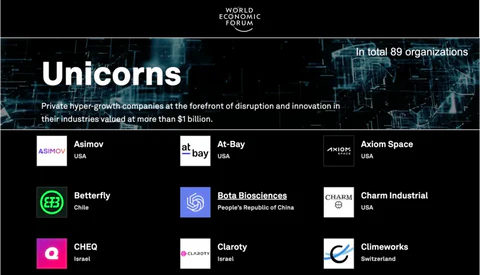
Bota Bio Joins the World Economic Forum’s Technology Pioneers Unicorn
The 2024 World Economic Forum (WEF) Annual Meeting was held from January 15-19 in Davos-Klosters, Switzerland, bringing together global leaders to discuss economic, social, and environmental issues. Bota Bio, along with the other global leading companies such as Open AI, Pivot Bio, and Asimov are listed as the WEF Unicorns. This list acknowledges the foremost global technology unicorns across various industries, distinguished by their capabilities in innovation, impact, and leadership.

Bota Biosciences (Bota Bio) is a global industrial biotechnology company connecting biological design to scale-up manufacturing to accelerate shifts to sustainable living. Bota has built an integrative bioengineering platform, to develop and implement efficient, eco-friendly, and cost-effective biomanufacturing technologies. Committed to its mission, Bota established its own pilot plant and manufacturing facility, affirming its dedication to offering scalable industrial solutions and market-ready products. This infrastructure strengthens support for customers and partners across industries such as nutrition, food, personal care, and animal health.
On January 18th, Dr. Cheryl Cui, Co-Founder and CEO of Bota Biosciences, joined speakers including Novozymes CEO Ester Baiget, Clariant CEO Conard Keijzer, and WIPO Director-General Daren Tang, in a panel discussion titled ‘Bio-based Path to Net Zero’. This panel was moderated by Editor-in-Chief of Nature, Magdalena Skipper and they discussed the opportunities and challenges of biomanufacturing for sustainable lifestyles and carbon neutrality.

Dr. Cheryl Cui highlighted the sustainability and safety of biomanufacturing over traditional chemical methods, while noting challenges in application, accessibility, and affordability. Addressing these challenges, Dr. Cui emphasized that Bota, as the leading industrial biotech company, will step out of the comfort zone, understand the consumer’s needs, and enhance the accessibility of biotechnology in the daily life. This will require more strategic partnerships and closer collaboration in the product value chain.
The panel highlighted the essential role of biomanufacturing and its challenges in tackling climate change and shifting towars sustainable lifestyle. It delved into different strategies for surmounting these challenges, such as enhancing consumer transparency and advocating for worldwide regulatory changes. Moving forward, it is crucial for the industry and government to build multi-tier collaboration and deliver on bio-based solutions to effectively address and overcome global environmental hurdles.
As Dr. Cheryl Cui said at the end of the panel, “Concerted efforts and a shared vision are essential. We are dedicated to making biotechnology more accessible in everyone’s daily life. This commitment defines Bota’s vision and direction.” Bota Bio is poised at the forefront of the biotech revolution, playing a pivotal role in shaping a more sustainable world.

